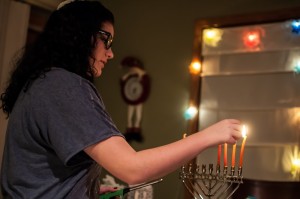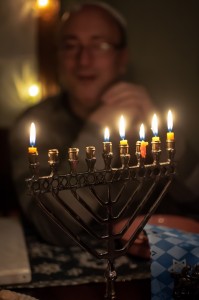Hanukkah In Oskaloosa
Oskaloosa, Iowa – Christmas fills the air this time of year, but for some in Oskaloosa, this time of year is for celebrating something completely different.
Quietly, shining in the windows of some homes is the area, one can find the menorah in celebration of Hanukkah.
Hanukkah this year came to conclusion on the evening of December 16, 2012. I was honored to be invited into the home of the Vogels.
Rick Vogel, a local professor, and his family are one of those few in the area who celebrates and observes the ancient holiday of the Jewish faith.
Mandi Vogel, daughter of Rick and Beth, is a student at Oskaloosa High School and has taken the Jewish faith, like her father, as her own.
Mandi and her father Rick gave me a brief introduction into the lighting of the menorah and it’s religious significance. While lighting the candles Mandi sang a traditional Jewish song.
According to Jewish tradition there was only one nights worth of oil remaining for the re-dedication of the Temple, that had been mostly destroyed. In the Temple they found only one container that had been sealed by the high priest, the remainder had been ruined. In the end, that one nights worth of oil lasted eight nights instead of just the one that it was supposed to. The significance of that is that, according to Jewish tradition, it takes eight days to create more of the oil to be used in the Temple.
Today those of the Jewish faith light a candle for each of the eight nights representing the miracle. Each night they share small gifts with one another with the eighth night being one of a larger gift. Mandi, as her dad says, enjoys the eighth night.
Rick says that it was easier when Mandi was younger, “When she was younger she wanted things like, ‘I want this thing that cost four dollars’. You got it. As they get older they want cars and computers and homes.”
After they lit the Menorah, the Vogels shared with us some traditional foods of potato latkes and matzoh ball soup. They were both delicious with the potato latkes being served with either sour cream or apple sauce. Tasting a tradition helps to bring one’s understanding of faith and tradition to a new level.
Being of the Jewish faith in Oskaloosa can be a challenge with the nearest synagogue being in Des Moines. “There is an occasional rent-a-Rabbi that comes into Ottumwa,” Rick says. “Mandi, Beth and I, we all like going to Des Moines.”
Mandi had her Bat Mitzvah in Des Moines. “It was the closest place to do it, where she was able to get religious training,” Rick explained.
When it came time to prepare for her bat mitzvah, Mandi says it was difficult to prepare for. “People go to Hebrew school since preschool but I started when I was in fifth grade and I had about three years to learn a whole new language, a whole new set of notes… It was so hard.”
Rick said that Mandi learned in two and a half years what took him five years.
Rick is originally from the New York area where he says that everybody was either Jewish or Catholic. “Those were the only religions I knew growing up. I didn’t even know that Christians and Catholics were different growing up.”
When it comes to their Jewish faith, “People have, for the most part, been very nice,” Rick explained. “There’s more people that don’t know what Judaism is.”
Rick says that, in his dealings, he’s dealt with no anti-Semitism, but Mandi said that she has had experiences of being treated differently because of her faith. She said that when she was younger it was more of a problem, but that now people have become more interested in her Jewish faith.
She now finds it as a unique opportunity to give people a different perspective on the Jewish religion, for a community that is predominantly of the Christian religion.
“Sometimes it’s lonely being Jewish here,” Rick says. There are a few other Jewish people in town, “but it’s just a matter of not being able to really communicate with other Jewish people. There’s a shared culture in Judaism… Just not being able to talk to people that have the same beliefs and understand the culture.”
One of those things that is rewarding to Mandi is being able to answer questions about her Jewish faith, and in turn “bringing them more culture… it’s rewarding in the way that it makes people more open minded.”
Rick says that he enjoys being able to talk and explain his Jewish faith, “it’s nice being able to explain it and show that Jewish people are like everybody else, and representing a religion is something that I kind of enjoy.”
Rick and Mandi will both say that it’s difficult to stay current with their Jewish faith when living so far from others of the same culture. “When she [Mandi] went to Hebrew school, I realized how rusty I was, and all this stuff I thought I knew… I had to relearn”, Rick explained.
The Vogels are a home of two religions. Rick and his daughter Mandi follow the Jewish faith, Mandi made the decision to follow the Jewish faith, while her mother Beth retains her Christian faith.
Being Jewish was something natural for Rick, who’s parents were both Jewish. “It is a choice today,” Rick says of maintaining his Jewish faith. “Back then, it’s just what I was. It’s part of a heritage and a culture we’re brought up to appreciate, it’s not just a religion. It’s a culture I think bonds Jewish people together in a unique way.”
“When I was younger, I was raised Christian,” Mandi says of the early days of exploring her faith. “I went to church, I went to Sunday School. I was in church plays.”
Without the opportunities of being able to explore Judaism, “Because we never lived near a Synagogue,” As she aged she became aware that there were more Jewish people in the world, “and not just me.”
Mandi asked if they could visit a synagogue, so Rick took Mandi to the synagogue on a day when they were holding Hebrew school.”I walked in and I just realized, this is where I belong.”
At first Mandi’s mother Beth, who is a Christian, was skeptical because, as Mandi says, “I don’t really follow through with things very well.”
Mandi got to begging and insisting to attend Hebrew school, “I made it through.”
“It kind of hurt my feelings, at first, when she decided to become Jewish,” Beth says. “I wanted her to be a Christian. But, I’ve dealt with it.”
Life and living such a long distance away from an active synagogue makes it difficult for Mandi to continue growing in and practicing her Jewish faith.
Rick says that with all of the good things their daughter is doing, “it’s hard to be Jewish here.”
Rick continued with, “I think the hard part for non-Jewish people to understand is the cultural ties of the religion. People go to church and express their religious beliefs. I think Judaism is somewhat unique in that is that there is a culture and a history that ties the people together. It’s an interesting bond.”
Practicing their Jewish faith locally can have its challenges Mandi says. She gives an example of a current school project where her French teacher is having them design a French Christmas dinner along with decorations and traditions. Her teacher said she could do a Hanukkah one, “I just kind of went with the Christmas thing, it’s not too bad.” Mandi said that she didn’t feel as though her teacher was being disrespectful.
Rick remembers a time when Mandi was in middle school, “A few years ago they were singing songs that were very, we love Jesus.” Rick said. “I found that very offensive.”
Mandi does remember playing a Hanukkah song in band, “I was very happy about that.”
Since Mandi lives in a household that celebrates both Hanukkah and Christmas, “she gets the best of both worlds”, Rick says with a smile. “We celebrate Christmas, I go to church with Beth. I’m glad that she goes to a great church.”
“They warmly welcomed me,” Rick says of the reception he’s been given by the church Beth, his wife, attends. “I don’t know who’s right or who’s wrong when it comes to religion. I’m not the keeper of the absolute truth so I don’t know who’s right or wrong,”
That is one of the interesting aspects of the Vogels and their support for each other and their faiths. They all attend either synagogue or church with each other. Being supportive of each other seems to be the most important thing to them.
Their home is sort of a microcosm of what happens in society today. I asked them if there was a lesson to be learned from their family that could be translated to society as a whole. Rick took a few moments and said “personally I would say that the key is to never say on these issues that ‘you are wrong‘. I’m unqualified to say Beth is wrong, and Beth would never say that I’m wrong. We don’t disagree.”
“When you respect those differences, then you can overcome a lot,” Rick said. He further explained, “I don’t think we’d be married right now if we had the viewpoint… ‘you’re wrong to believe like you do‘.”

















